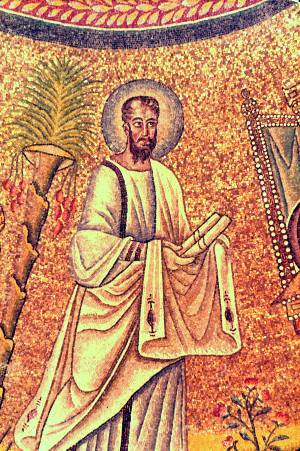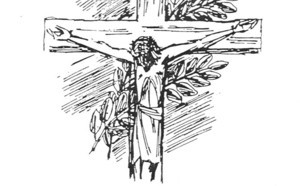THE GREAT APOSTLE PAUL
 | ||||||
On the Vigil of SS. Peter and Paul in 1998 Benedict XVI declared that the following year on the Vigil for this solemnity would mark the beginning of the Pauline Year. On that occasion he told the world that "'to-day, too Christ needs apostles ready to sacrifice themselves. He needs witnesses and martyrs like St. Paul.'"
In many ways Paul has not been in favour with Christians. Mention his name and eyebrows raise. Yet he is the most influential Christian of all times. Would the salvation for all by Christ have filtered through the Roman world in the first century A.D. without Paul? I doubt not.
Paul’s life
There are only two sources to write a biography on Paul: the genuine Pauline letters and to a lesser extent Acts (the main reason for this not having the same value as letters as it was written c. 30 years after the events took place).
Where was Paul born?
Paul never tells us where he was born, but from Acts we glean it was in Tarsus, the prosperous capital of Cilicia – it was “no mean city (Acts 22.3) as part of the great Roman empire. Paul made sure to let others know that he was a Roman citizen. This city had a large Jewish population. So his family would have been part of the Diaspora. Paul tells us that he belonged to the tribe of Benjamin (Rom. 11.1) to which the first king of Israel belonged, his namesake Saul.
When was he born?
A good guess is c A.D. 5 -10 during the reign of the great Augustus. In Acts at the stoning of Stephen Paul is described as a young man (Acts 7. 58). This event took place not long after the death of Christ, and so it would have been A.D. c. 33 -4.
Where was he educated?
Paul was probably educated in Tarsus, a city known for its excellent schools and culture. He certainly knew Greek well as he wrote good Greek, quoted from the Septuagint, and knew Deutero-canonical Books either composed or preserved in Greek. He knew too basic Hellenistic rhetorical skills and ethics. As a Jew he would have been taught the Scriptures and that was involved in that, especially the keeping of the Law and festivals. The main advantage in later missionary life for Paul was that he knew the Gentile world in a way that Peter and James, the brother of the Lord never knew. For example he knew the household structure of Greek-Roman culture as is evidenced in 1 Corinthians.
It may even been in Tarsus that he learnt his trade – tent making (Acts 18.3). Later in his life as a missionary he prided himself as being able to take care of himself through his trade (one wonders where he found the time with all the travelling except in places like Corinth where he spent considerable time).
How do we evaluate the reference in Acts 22.3 that stated that Paul had been educated in Jerusalem and had sat at the feet of the great Pharisee, Gamaliel? He taught during the life of Jesus but Paul does not indicate anything in his letters of being in Jerusalem during Jesus’ life. We know that Paul was in the holy city when Stephen was stoned. As it would seem that the apostle knew Hebrew and/or Aramaic, he almost certainly came to Jerusalem to study the Law. After all he informed the Galatians that he was zealous for the traditions of his ancestors (Gal. 1 .14).
His life before his conversion
In his letters (Gal. 1 .13, I Cor. 15.9, Phil 3.6) Paul revealed how passionately he wanted to destroy those who followed in “the way”. So he conducted persecutions against the followers of Christ (I Thess.2. 14 and Acts 8. 3; 9. 1 – 2; 22. 3 – 5, 19; 26. 9 – 11). How does one reconcile this with Gal. 1. 22 that stated that three years after his conversion Paul was not known by Christians in Judea?
Why did Paul hate these fellow Jews so intently? Probably the answer is in Philippians “Concerning zeal, persecuting the church: touching the righteousness which is in the law [I, Paul am] blameless” (3.6). He was following the thinking of what he was, a Pharisee. In the life and witness of Stephen Paul was seriously challenged by one who identified so closely to Jesus and in His name. Furthermore Stephen saw so clearly that God did not live in the temple built by hands (Acts 7.48), the old had to give away to the new in the power of the Spirit. Paul consented to his death. Nevertheless to witness the life of one so in turn with heavenly thoughts must have disturbed Paul. The seed I think was already there before he saw the Light (Acts 9. 3).
And in those years out in the wilderness relearning in the power of the Spirit after the Damascus experience in the meaning of living in Christ rather than in the Law could only have been a catalytic experience. To have one’s life turned upside down as Paul’s life was, only those who have experienced an overnight conversion can appreciate.
The Believer
In that revealing of all letters of Paul, Galatians, revealed that God was pleased “to reveal his Son to me that I might preach him among the Gentiles” (1. 16). Again from Galatians it would seem that after his wilderness experience Paul visited Jerusalem and conversed with Peter and James, the brother of the Lord (1. 18 -19). Probably as mentioned in his first letter to the Corinthians this was when he was told about the tradition of the Lord Jesus (I Cor. 11. 23; 15. 3). Again from Galatians we learn that this was a brief visit (1. 18) and then he returned to Tarsus (Acts. 9. 30). Probably he was there longer than we have realised. His next journey, some fourteen years later with Barnabas and Titus, he would rub shoulders “with the pillars of the Church” over the acceptance of Gentile Christians without first becoming Jews (Gal. 2. 1 – 10).
Is it to that man “full of the Holy Spirit and of faith” and hence a good man, that Paul became accepted by early Christians and eventually became the most influential Christian? Barnabas went to Tarsus and brought him back to Antioch, that early centre of both Jewish and Gentile Christians. Barnabas had been sent to this important Roman centre when rumours had reached Jerusalem about the practices of Gentile Christians (Acts. 11. 24. 26). What he found was a wonderful spirit, and with other teachers including Paul they ministered and taught in the Christian community at Antioch for over a year. No wonder it was here that the followers of Christ were first called Christians.
Paul and Jewish Christians
Although koinoinia was extended to Paul and others by the Christian leaders in Jerusalem, it was a different story in Antioch when Peter and others came from Jerusalem. Undoubtedly it was a fierce row Paul had with Peter, but not only with Peter but also Barnabas, so much so they split company. Paul never worked from Antioch again. Peter and the Jewish Christians won over Paul.
Paul the Missionary
Antioch on the Orontes River provided access to the sea from where Paul left on his journeys. He would have been mystified if he had been told he had made three missionary journeys as the church has come to do. However that classification does help us to cover the vast territory he covered on foot and on sea.
Acts. 13. 3 – 14. 28 cover what we know as the first journey c. A.D. 49. From Antioch Paul, Barnabas and Mark sailed to Cyprus and then onto what we know as Turkey to-day but then Asia Minor cities: Perga, Pisidian Antioch, Iconium, Lystra and Derbe before Paul and Barnabas (Mark left after Perga) returned to Antioch. In the towns they went to the synagogues first, but mostly they met opposition and hatred. For example in Lystra the authorities stoned Paul. Thus he began preaching to Gentiles, probably the first were proselytes.
Acts 15. 40 – 18. 22 cover what we know as the second journey c. A.D. 50 -2. Paul first revisits those places in Asia Minor that he had gone to a little earlier. He crosses over into Europe from Troas to Macedonia. He evangelised in Philippi. Thessalonica, Beroea, Athens and Corinth. In the last of these Grecian cities he spent eighteen months from where he wrote his first letter to the Thessalonians c. A.D. 51. Even though he spent longer here than any other city, it would seem the Christian community was the most plagued with troubles. From here he travelled from the port of Cenchreae to Ephesus with Aquilla and Prisca. (The fact that Paul was hauled before the proconsul, Gallio, has enabled historians to date Paul’s activities in this area to c. A.D. 52. The end was to greet the church in Jerusalem.
Acts. 18. 23 – 21. 15 cover the third journey c. A.D.54 – 8. Once more he went though Galatia and Phrygia to Ephesus. Here he stayed three years, and many scholars think that he was imprisoned here from where he wrote most of his letters (Philippians, Philemon, Galatians, I Corinthians). Around A.D. 57 he left for Troas and sailed to Macedonia again where he met Titus. They both went to Achaia and Corinth where he spent three winter months and taking up a collection for Christians in Jerusalem. It was in Corinth that Paul wrote Romans. From the Isthmus he travelled north to Philippi where he spent Passover and then over to Asia Minor again, landing at Troas. From here Paul worked his way down the coast to Miletus where he met up with leaders from the church of Ephesus and bade farewell to them all. Sailing south he touched on Tyre and Caesarea. At the former he stayed with Philip one of the seven, and at the latter, Agabus, a prophet had travelled from Jerusalem to warn him of the dangers about visiting to the holy city.
The end of Paul’s life
Acts 21.15 – 28.31 recount the last few years of Paul’s life: his arrest in Jerusalem, imprisonment in Caesarea, his trials before Felix and Festus, his journey to Rome, the shipwreck off Malta and his arrival in Rome.
The legacy of Paul
Paul’s comfortable life was turned upside down with his encounter with the Lord on that Damascus Road. Yet he is able to tell us in Philippians 3. 8, “I count everything as loss because of the surpassing worth of knowing Christ Jesus my Lord.” Yet it went much deeper and more personal. A few verses later in 3. 12 he spoke of being “taken over” by Christ Jesus. His life was totally committed to our dear Lord. As he shared in Romans 8. 35 -7, “Who will separate us from the love of Christ? Will anguish or persecution or famine or nakedness or peril in the sword? … In all these things we are conquerors because of him who loved us.” “For me to live is Christ” (Phil. 1. 21).
A LITANY BASED ON THE LIFE OF ST. PAUL
The response after each petition is: Help me to live as Paul did, in Christ.
Paul consented to the death of Stephen. Help me Lord to understand that even when I sin God can use me as He did with Paul. R.
Paul was confronted “Why are you persecuting me?” by Jesus on the road to Damascus. Help me Lord to apprehend Your voice when I am sinning. R.
Paul was blinded the light from heaven. Help me Lord in my times of darkness to reach out to you. R.
Ananias restored Paul’s sight even though he saw him as an enemy. Help me to minister even to those I find difficult. R.
Paul spent a long time in the desert after his conversion preparing for his ministry. Help me Lord to know it is only in the stillness of soul that I can be your instrument. R.
Paul was called to preach the Gospel in many lands and in many different situations. Help me to evangelise wherever I am in life. R..
Paul suffered many hardships such as shipwrecks, beatings, and imprisonment for the sake of the Gospel. Help me Lord to have that hope witnessed by Paul when I face devastating times. R..
Paul endured many persecutions such as stoning in Lystra. Help me Lord to be courageous and calm when I face life’s problems. R..
Paul taught us the great virtues of faith, hope and love, of which the greatest is love. Help me to love even those I find difficult. R..
Paul insisted that our lives must be lived in and for Christ. Help me Lord to surrender my will completely to you. R..
Paul preached that our salvation is through the righteousness of Christ. Help me Lord to know that you alone give me salvation. R..
Paul taught that the most powerful name in the world is Jesus. Let me Lord call upon you constantly. R.
Paul taught that we have received the spirit of adoption by which we can cry out to our Father. Help me Lord to pray for the Spirit to bear witness within me as a child of God. R..
Paul preached that are a new creature in Christ. Help me Lord to be faithful to my baptismal promises. R..
Below is a litany that will help us to live closer not only to Paul but also to Christ
For I am not ashamed of the gospel of Christ for it the power of God unto salvation to every one who believes (Rom. 1. 16).
Therefore being justified by faith
we have peace with God through
our Lord Jesus Christ (Rom. 5.1).
For Christ sent sent me not to baptise but to preach the gospel (I Cor. 1. 17)....
Am I not an apostle? am I not free? have I not seen Jesus Christ our Lord? are not you my work in the Lord? (I Cor. 9.1)
For you are the children of God by faith in Jesus Christ (Gal. 3. 26).
I thank my God upon every remembrance of you (Phil. 1. 3).
 | ||||||
 | ||||||
Marianne Dorman
Return to Index
Paul's teaching on Christian Community


